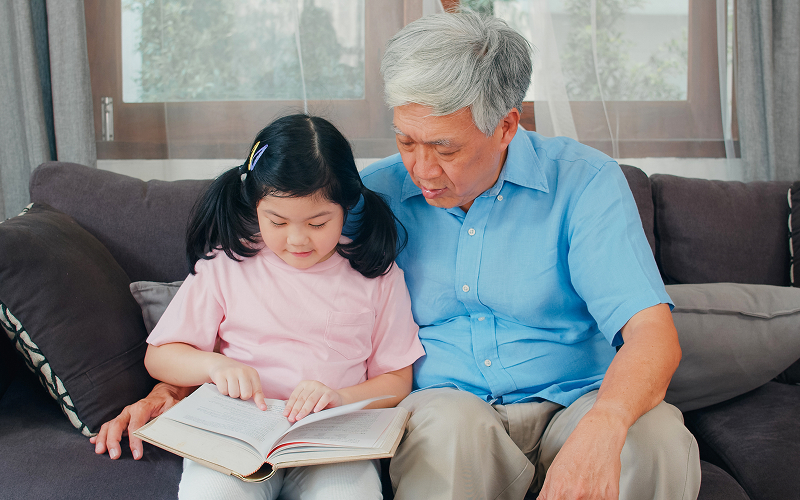Beyond academic benefits, language acquisition in early childhood also has cultural and familial implications. This instance makes Chinese immersion preschools platforms for linguistic development and catalysts for rebuilding and strengthening intergenerational connections.
Discover how attending an immersion preschool and joining a playgroup in Singapore can deepen language bonds between children, parents, and grandparents.
Language Reconnection Between Children and Grandparents
Mandarin serves as the bridge between children and their elderly relatives in many local households. However, with younger generations increasingly speaking English as their dominant language, this intergenerational link is at risk of erosion. Chinese immersion preschools help reverse this trend by giving children the tools to communicate confidently with Mandarin-speaking grandparents. Daily exposure to Mandarin through structured lessons, songs, storytelling, and role-play reinforces vocabulary and conversational skills. Due to this, children are more inclined to initiate conversations with their grandparents in Mandarin, often leading to richer and more meaningful interactions at home.
Furthermore, the reinforcement of language at school equips children with traditional phrases, idioms, and even festive greetings, which hold cultural significance to the older generation. This instance creates a two-way relationship—children practise their new skills, and grandparents become active participants in reinforcing their learning, thereby closing the communication gap that often exists in multilingual families.
Parental Involvement and Language Reacquisition
Parents play a critical role in maintaining language consistency at home. Many parents consider enrolling their child in a Chinese immersion preschool to be an opportunity to revisit or improve their own language skills. This phenomenon is particularly evident among parents who may have studied Mandarin in school but have since lost fluency. Parents are re-exposed to the language in digestible forms as their children bring home songs, books, and activities.
Preschools often facilitate this re-engagement through parent-child homework, storytelling sessions, and cultural celebration days. These activities encourage parents to speak Mandarin at home, even if only in limited contexts. Parents, in some cases, enrol in beginner or conversational Mandarin classes to better support their child’s journey. This approach creates a parallel learning experience that enriches both generations and reinforces the use of Mandarin as a family language rather than just a school subject.
Cultural Transmission Through Everyday Interaction
Language is a vessel for culture. A Chinese immersion preschool does more than teach sentence structure or vocabulary; it integrates traditional customs, celebrations, and values into daily routines. Children learn the significance of Chinese New Year, Mid-Autumn Festival, and other heritage practices through hands-on activities and storytelling. These experiences become talking points at home, triggering stories and reflections from older family members.
This dynamic fosters multigenerational bonding over shared cultural identity. Grandparents can recount personal experiences or teach traditional games and songs, while children share what they’ve learned in class. These exchanges not only preserve cultural continuity but also validate the role of the older generation as cultural custodians, strengthening their sense of purpose within the family unit.
Playgroup Foundations That Set the Stage Early
Enrolling in a Mandarin-focused playgroup is often the first step for families with toddlers in cultivating a language-rich environment. Unlike academic-focused programmes, playgroups introduce Mandarin organically through songs, sensory play, and routines. This low-pressure setting allows toddlers to associate the language with positive experiences.
Parents and grandparents who accompany children to these sessions gain insights into how language can be reinforced through play and daily conversation. This early exposure often sets the foundation for consistent Mandarin use across generations. Families become more intentional about language planning at home—choosing Mandarin books, switching on Mandarin cartoons, or designating “Mandarin-only” hours—turning what was once passive exposure into an active family effort.
Conclusion
Chinese immersion preschools go beyond preparing children for primary school; they cultivate multigenerational language bonds that enrich family life. These organisations help children converse more effectively with grandparents and encourage parents to re-engage with the language, promoting linguistic and cultural continuity in increasingly English-dominant homes. Since language becomes a shared experience, it transforms from a subject to a familial bond that spans generations.
Visit Orange Tree Preschool and let us help strengthen Mandarin fluency within your family.

